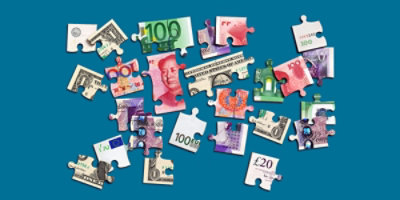-
Personal Banking -
Insights
What Are NFTs?
It's hard to watch the news, use social media or even have a conversation lately without someone bringing up NFTs. But if you still don't know what an NFT is, you're not alone! Conversations are still relatively new regarding NFTs and where they fit into the cryptocurrency space and alternative investing, leaving many people to ask questions like: What are NFTs and how do they work?
What Is an NFT?
A non-fungible token (NFT) is a unit of data that is kept within a digital ledger or that identifies a digital asset as unique and not interchangeable. The technology used to produce NFTs enables a person to own an "original" version of a digital asset.
The unique nature of each NFT is preserved using blockchain — the same technology used by cryptocurrencies. Most NFTs use Ethereum, an open-source and decentralized blockchain.
But what does all this mean?
Jack Dorsey, the CEO of Block and former CEO of Twitter, famously sold his first tweet as an NFT for over $2.9 million in 2021. Even though the tweet has been seen, shared and copied by many, the individual chain of ownership that tracks the tweet is unique. The authentication comes from a certificate secured with blockchain technology similar to other crypto technology, such as Bitcoin.
Though not entirely the same, NFTs can be conceptually compared to original pieces of art. While there are many prints and copies of a famous painting such as Vincent Van Gogh's "Starry Night," there will only ever be one original painting. NFTs can be thought of as the "original" and definitive version of a digital asset such as an image.
What Is NFT Investing?
NFTs are promising for artists as an evolution of art collection, and they also have potential applications in the business world. Creating and selling digital assets might make sense for creators who want to sell their art without the hassle of a middle man.
But when it comes to buying NFTs for their value as collectibles, buyers should first seriously evaluate the risks of investing in NFTs. The lasting value of NFTs is uncertain and will fluctuate based on demand for the work itself. Some analysts are concerned that the recent NFT boom is a bubble, and that many high-cost NFTs won't fetch anywhere near their original selling price — if any price at all — in the future.
For some NFT collectors, the risk of financial loss is acceptable as many view them as a way to financially support their favorite artists.
How to Buy An NFT?
NFTs are bought and sold through a purpose-built NFT marketplace, similar to an Amazon or Etsy for digital assets. Multiple marketplaces exist and continue to show up weekly. You can visit marketplaces to buy NFTs at a fixed price or through a virtual auction. During an auction, prices can fluctuate depending on demand, making them volatile.
So what happens after you buy an NFT?
The digital asset becomes yours to collect, display or use in the digital space however you see fit. You can also list the asset for sale again. However, collectors are only granted copyright for an NFT if it was specifically provided in the terms of the sale.
How to Sell An NFT
While some platforms allow you to create NFTs for free, selling them may be a different story. Marketplaces charge a fee for NFT sales, and these fees are called "gas." The amount of gas you need for a transaction can vary.
You can list your NFT on any marketplace that supports the blockchain where the NFT was built. Based on the demand, you can determine if you want to list your NFT at a fixed rate or open a virtual auction. The marketplace will then handle the transaction and transfer of the asset.
The Most Popular NFTs
Traditionally, artwork is valuable because there's only one original, whereas digital art can be copied and reproduced with much more ease. That's where NFTs come into play. NFTs are expensive because, theoretically, you can authenticate original work in digital spaces similar to the way traditional artwork is authenticated.
However, since NFTs don't have the same physical nature as traditional art, the high prices some have fetched are difficult to understand for many outsiders. This has resulted in a flurry of headline-making sales and significant interest in the topic.
According to Google Trends, the top 5 searches for NFT art pieces (from January to September 2021) were:
- An NFT of the first tweet sold for $2.9 million.
- Hashmasks, a collection of NFTs that sold for a combined $16 million.
- An NFT showing Doge, a well-known Internet meme of a Shiba Inu, sold for $4 million.
- Grimes, a Canadian musician, sold a collection of 10 NFTs for $6 million.
- Everydays: the First 5000 Days, a collage of 5,000 digital images created by the artist Beeple, sold for $69 million.
How Are NFTs Being Used in Entertainment?
On the surface, NFTs might not be relatable to everyone, and that's because not everyone has almost $3 million to spend on a tweet that they can screenshot for free.
But when it comes to Hollywood, the future of NFTs has less to do with collectibles and more to do with fan experiences.
"There's a real-world application for this next-generation way to finance and monetize content. That's the exciting part, this transformation that's happening," said FilmTrack President Stephen Kassin.
According to a recent Variety report, "A growing number of artists are exploring using NFTs to create an even deeper link with their audience by offering fans an opportunity to acquire a direct financial stake in projects."
However, NFTs aren't just being used as a way to sell original digital art. Entertainment powerhouses such as the NFL are using NFTs as a way to provide fans with unique digital tickets as keepsakes for games they've attended. As paper tickets are becoming less common for event entry, it's possible that fans and attendees will be keeping NFTs as a lasting and unique memento from their experience.
Ultimately, NFT usage comes back to authenticity and experience.
NFTs can be used to grant limited or exclusive access to digital content and events, and that's just scratching the surface of possibilities for artists, record labels, entertainment brands and even tech companies. As the physical and digital worlds collide with more frequency, NFTs are an attempt to reproduce the tangible forms of ownership that we're accustomed to.
Are NFTs a Good Investment for You?
Conversations around NFTs continue to develop, but it's important to tread lightly as you continue learning about this type of investment. NFTs are considered incredibly volatile and should fit within your personal risk tolerance. The unpredictability of NFTs have led many experts to suggest that people should buy the NFTs that they are personally interested in rather than ones they think will make money in the future.
If you are considering an NFT purchase, you should speak with your financial advisor, just as you would do with other high-risk investments.
This article is for general information and education only. It is provided as a courtesy to the clients and friends of City National Bank (City National). City National does not warrant that it is accurate or complete. Opinions expressed and estimates or projections given are those of the authors or persons quoted as of the date of the article with no obligation to update or notify of inaccuracy or change. This article may not be reproduced, distributed or further published by any person without the written consent of City National. Please cite source when quoting.
This article is for general information and education only. It is not to be construed as an offer, or solicitation of an offer, to buy or sell any financial instrument. It should not be relied upon as specific investment advice directed to the reader's specific investment objectives. Any financial instrument discussed in this article may not be suitable for the reader. Each reader must make his or her own investment decision, using an independent advisor if prudent, based on his or her own investment objective and financial situation. Prices and availability of financial instruments are subject to change without notice. Financial instruments denominated in a foreign currency are subject to exchange rate risk in addition to the risk of the investment. City National Bank (and its clients or associated persons) may, at times, engage in transactions in a manner inconsistent with this article and, with respect to particular securities and financial instruments discussed, may buy from or sell to clients or others on a principal basis. Past performance is not necessarily an indication of future results.
City National, its managed affiliates and subsidiaries, as a matter of policy, do not give tax, accounting, regulatory or legal advice and any information provided should not be construed as such. Rules in the areas of law, tax, and accounting are subject to change and open to varying interpretations. You should consult with your other advisors on the tax, accounting and legal implications of actions you may take based on any strategies presented, taking into account your own particular circumstances.
This article may not be reproduced, distributed or further published by any person without the written consent of City National. Please cite source when quoting.
Alternative investments are speculative, entail substantial risks, offer limited or no liquidity and are not suitable for all investors These investments have limited transparency to the funds' investments and may involve leverage which magnifies both losses and gains, including the risk of loss of the entire investment. Alternative investments have varying, and lengthy lockup provisions





